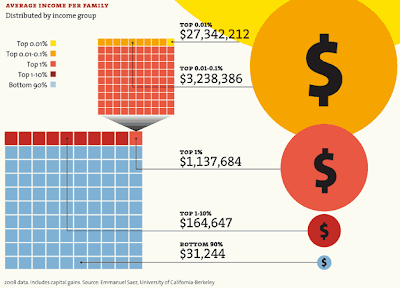I think the following figures speak for themselves. The author of our book has been spouting off statistics about inequality in the first portion of the book. These figures show graphically what he's saying and also represent an update to his year 2000 data.
Enjoy... or cry.
 |
| Average income per family–distributed by income group |
 |
| Net worth distribution |
 |
| Change in income since 1979 |
 |
| Poll data on actual vs. perceived vs. desired wealth distribution |
 |
| Winners and losers for 2007-2009 |
 |
| CEO vs. worker pay and historic tax rates for the top bracket |
 |
| Share of total tax revenue by source |
The final two figures should be taken together with their mutual source at the bottom.
I don't know whether I want to elaborate on these figures or not. Reading Gates often makes me feel depressed or angry. That's not really a great response. Fortunately, it also makes me determined to challenge the paradigm that brought our society to this point. That's why I'm going to law school and that's why I'm planning some exciting projects for after I'm out of law school.
A lot of this discussion seems so timely. The protests in Wisconsin and the rhetoric about cutting the deficit really illuminates who our elected officials pledge allegiance to. I'll give just one example:
If you listen to the debate around "fixing" Social Security, you'd think that there are only two possible solutions: cut benefits or raise the retirement age. I'd like to offer a third solution that used to be talked about (during the 2008 campaign), but isn't anymore. Raise the Social Security tax cap. Right now, Social Security taxes are only collected on the first $106,800 of a person's income. We can raise that and fix our problem without cutting benefits, raising the retirement age, or burdening lower income workers any more than they already are.
Why should people who don't benefit (directly) from social security (the rich–they simply don't need it) pay into the system? I'd posit two reasons. First of all, I believe everyone benefits from reducing the number of people in this country who live in dire poverty. Social Security acts as a financial safety mechanism for the older citizens in our society.
Second, as the wealthiest country in the world, I think we ought to have the common decency to take care of our elderly in at least a marginal way. To fix Social Security by modestly shifting more of the payroll tax burden to the affluent seems to me a largely painless solution.
Looking at these figures makes the arguments of conservatives during this time of fiscal austerity sound pretty hollow. They're telling us that the only way we're going to balance the budget is to cut programs that provide assistance to or benefit the working class (Social Security, pension plans, collective bargaining rights, etc.), while extending tax breaks for their wealthy friends (like we just did in December). Give me a break. The minimum wage in this country hasn't even come close to rising with inflation (I read something the other day that said it should be somewhere around $15/hour). The working class has worked longer hours for less pay for decades. Look at the third figure, only the top 20% have even seen any increase at all in real after-tax income since 1979. The wealthy make their money off our backs. It's time they pay their dues and give us a break.








These numbers are indisputable as well as despicable! That 3rd option for social security solutions is too fair for the fat cats to swallow. (fJb aka fellow Jesus-bottle)
ReplyDeleteI think what we need to realize is that the working class ultimately has more power than "fat cats." There are simply more of us. One person, one vote.
ReplyDeleteThis country shouldn't be run for the benefit of a few. It should be run for the benefit of the many. They try to tell us that we strengthen this country by strengthening the wealthy. I would argue that we strengthen this country most when we strengthen the working class. fJb